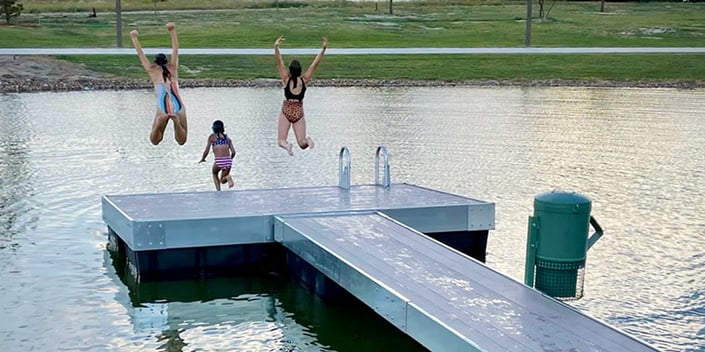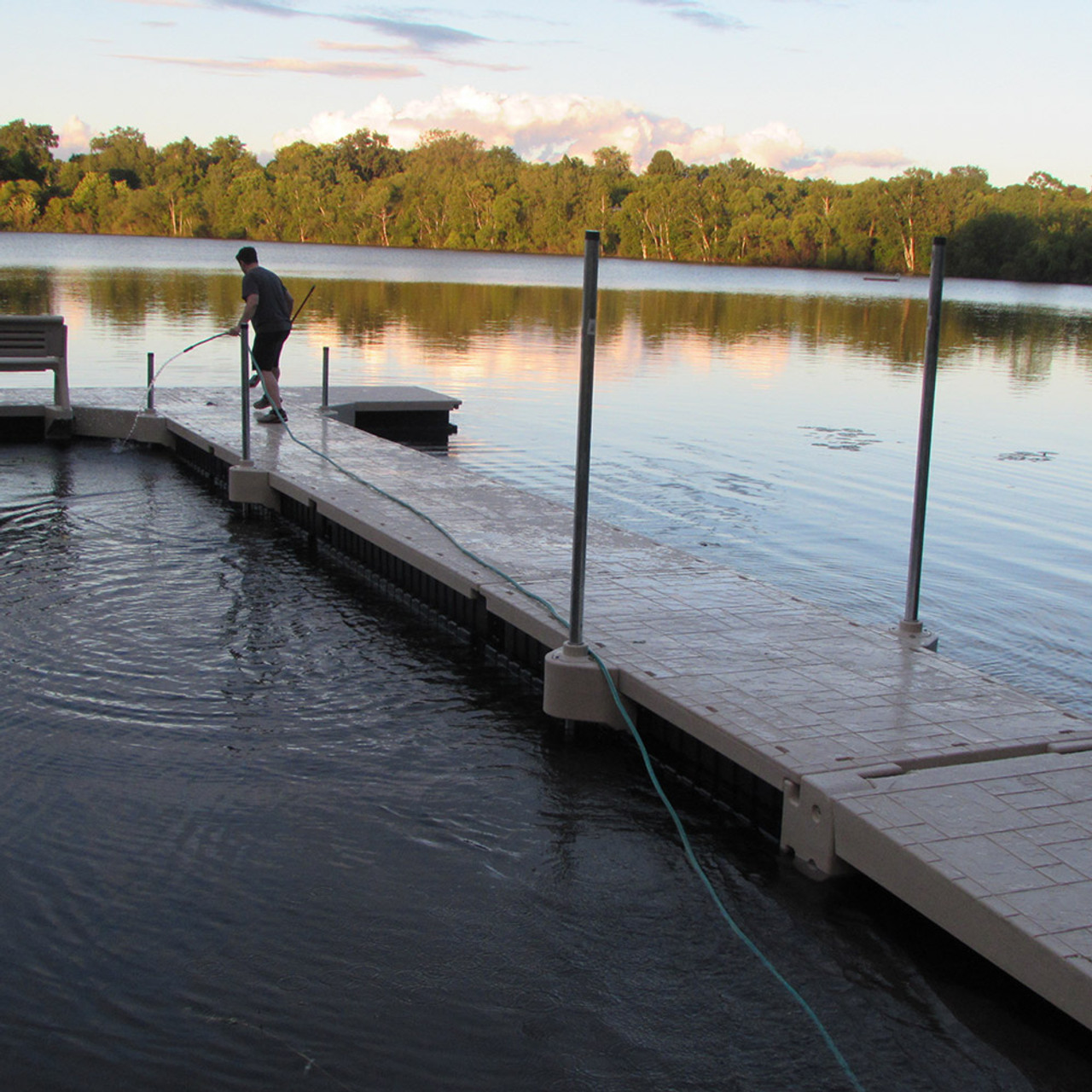Floating Docks: The Suitable Option for Versatile Water Gain Access To
Floating docks existing a compelling service for a variety of water accessibility requires, providing flexibility that transcends typical mooring choices. The modular nature of floating docks assists in personalization, catering to details demands.
Benefits of Floating Docks
Floating docks offer numerous benefits that improve water access for numerous applications. Their capability to fluctuate with transforming water degrees makes them particularly advantageous in settings with changing tides or seasonal variants. This versatility guarantees that vessels can easily tie without issue for the water's depth, giving a reliable system for leisure, business, and commercial uses.
Additionally, floating docks are frequently built from sturdy materials that withstand deterioration, making them suitable for long-term usage in aquatic settings. Their installation is normally much less intrusive than traditional fixed docks, lowering the ecological impact and helping with quicker implementation (floating docks). This versatility enables easier relocation or reconfiguration according to user requirements or environmental modifications
Safety is another key benefit; floating docks can give secure accessibility for people boarding or getting off from watercrafts and lower the threat of crashes related to unpredictable surface areas. They can be designed to suit a selection of devices, such as cleats and fenders, enhancing capability. On the whole, floating docks stand for a reliable option for enhancing water access across varied markets while promoting safety and ecological sustainability.

Kinds Of Floating Docks
Numerous sorts of floating docks deal with various demands and atmospheres, each made with particular attributes to optimize performance. One of the most common kinds consist of modular docks, which consist of interlacing areas that enable very easy customization and growth. These docks are suitable for recreational use, as they can be tailored to fit numerous watercraft dimensions and water conditions.
Another popular option is the fixed floating dock, which remains anchored in location yet drifts with changing water levels. dock company. This type is especially fit for locations with marginal tidal variations, providing stable gain access to for angling or swimming. Furthermore, there are drive-on docks, which include a sloped layout that permits watercrafts to easily drive on and off, making them suitable for personal watercraft and smaller vessels
For commercial applications, heavy-duty floating docks are available, created from enhanced products to withstand considerable loads and severe marine environments. Finally, environment-friendly floating docks use sustainable materials and designs to reduce environmental impact, frequently incorporating features like vegetation to sustain neighborhood wild animals. Comprehending the different kinds of floating docks makes certain that customers can choose the most suitable service for their particular demands.
Setup Process Review
An effective setup of floating docks requires mindful preparation and attention to detail to ensure optimal efficiency and safety. The first action involves evaluating the site problems, including water deepness, existing, and possible challenges. This analysis notifies the selection of the appropriate dock products and layout customized to the particular environment.
Next, obtaining required authorizations is critical, as several territories have policies pertaining to building on water bodies. Once authorizations are secured, the setup can continue. Begin by preparing the structure, which may include anchoring systems or pilings customized to the dock kind and local problems.
Adhering to the foundation configuration, construct the dock sections according to producer specs. Make certain image source that all components are safely secured and straightened to endure environmental stress and anxieties. Position the dock in the designated area, ensuring it is degree and secure.

Maintenance Tips and Finest Practices
After the setup process is complete, ongoing upkeep plays an essential function in making sure the durability and functionality of floating docks. Routine evaluations should be performed to recognize any type of signs of damage, wear, or damage - floating docks. Look for any type of loose installations, fractures, or splitting up in the dock areas, as these can compromise architectural stability
Cleaning the dock is vital to get rid of debris, algae, and various other build-up that can influence its appearance and safety and security. Use a gentle stress wash occasionally to maintain sanitation without triggering damages to the surface. In addition, applying a safety sealer every few years can aid improve longevity and withstand environmental wear.
Take note of the mooring lines and anchors, guaranteeing they are protected and free from corrosion. Change any type of abject elements quickly to avoid hazards. Seasonal adjustments might also be needed; during extreme weather, enhancing the dock or rearranging can prevent damages.
Applications for Floating Docks
Floating docks serve a wide range of applications, catering to both recreational and business needs. In leisure setups, they give seamless access to waterways for activities such as boating, angling, and swimming. Their flexible nature permits for installment in varying water levels, guaranteeing secure and secure access regardless of tidal fluctuations.
Readily, floating docks are indispensable for marinas and waterfront companies. They help with the docking of vessels, allowing effective packing and discharging of products. Their modular style enables for simple growth or reconfiguration to fit altering company needs, making them excellent for watercraft services, scenic tour procedures, or angling charters.
Furthermore, floating docks are utilized in ecological applications such as marine research and habitat reconstruction. They can function as systems for scientific studies, checking water quality, or carrying out wildlife surveys without disturbing sensitive communities.
In industrial contexts, floating docks are utilized in building tasks, supplying access to hard-to-reach locations for devices and workers. Their flexibility, durability, and marginal influence on the setting make explanation them an optimum selection for a wide range of applications, boosting both performance and ease of access in various water-based settings.
Final Thought
In conclusion, floating docks represent an optimum option for diverse water accessibility needs, owing to their flexibility, longevity, and modular design. Floating docks offer as a valuable asset for leisure, commercial, and ecological tasks, guaranteeing reliable access to rivers and advertising lasting methods in aquatic environments.
Floating docks existing a compelling solution for a selection of water accessibility requires, supplying versatility that transcends standard mooring choices.Floating docks deal many advantages that improve water gain access to article for different applications. Overall, floating docks stand for a reliable solution for improving water access across diverse markets while promoting security and ecological sustainability.
Another popular alternative is the fixed floating dock, which stays secured in area however drifts with changing water levels.In verdict, floating docks stand for an optimum solution for diverse water gain access to needs, owing to their flexibility, sturdiness, and modular layout.